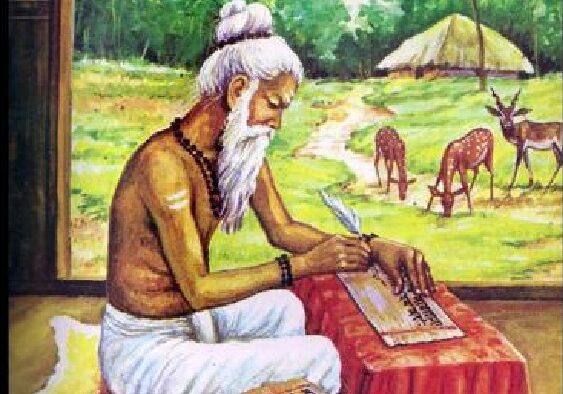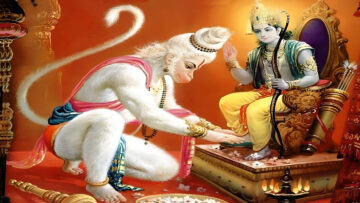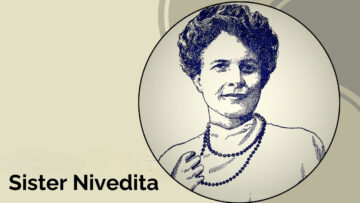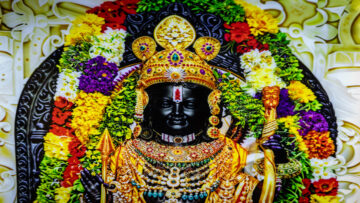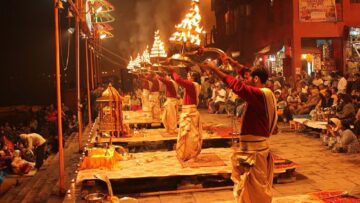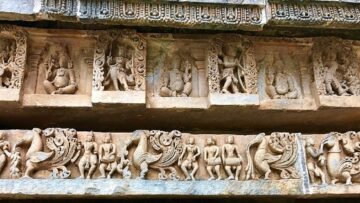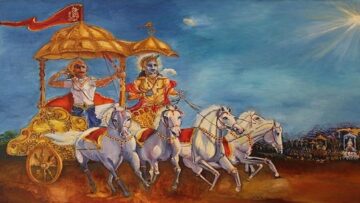In the previous article, I sketched the life accounts of Rishis like Veda Vyāsa, Rishi Vashishtha, Rishi Vishvamitra, Rishi Kavasha Ailusha, and Rishi Jaigishavya. Now let us look into the life accounts of a few more Rishis.
Rishi Satyakāma Jabāla
Once, a boy named Satyakāma Jābāla wanted to study a lot. He heard that Rishi Hāridrumata Gautama was a very renowned scholar and that he was accepting new students. So, he approached Gautama with a request to take him in as a student too.
In those days, it was a custom for the teacher to ask about the family background (Gotra) of their students, because the students had to live all the time with others in boarding schools. They would interact with each other throughout the day. A single student from a bad family could spoil the atmosphere of the boarding school.
For this reason, famous teachers who ran the top-notch schools had to make sure that all of their students were from good families and had good values. Therefore, Gautama, also asked Satyakāma, “What is your Gotra, and who is your mother and father?”
Now, Satyakāma had never seen his father. So he went to his mother to ask. When he put the question to her, she trembled with fear, but told him truthfully, “When I was young, I knew a lot of men.
Therefore, I do not know who your father was. My name is Jābāla. Therefore, you are Satyakāma Jābāla.” Now Satyakāma felt ashamed of what he heard. He thought that if he were, to tell the truth to his teacher, he may be refused admission outright. Yet, he decided to speak the truth.
When he approached the teacher, he found all other students in the classroom studying. The teacher asked him, ‘Did you find out about your family details?” Satyakāma Jābāla said, “Guruji, my mother Jābāla does not know, who my father was. Therefore, she said that I am Satyakāma Jābāla.” When the students heard this, there was a hushed silence, because they were all aghast. They were sure that Gautama would immediately turn him out of the school.

But Gautama said, “This child did not hesitate to speak the truth. And truth alone is the true mark of belonging to Brahmana Varna and a good family. And therefore, I have no hesitation to say that Satyakāma’s parents are both very noble because he did not hesitate to speak the truth to me. I will surely accept him as my student.”
And so, Satyakāma became a student of Gautama. In fact, in the course of time, he became a great Rishi himself and compiled several Vedic and other Hindu scriptures. The Jābāla Upanishad, a sacred scripture of the Hindus named after him still exists and is highly respected to this day.
Rishi Angirasa
Although King Chitraketu had many queens, none of them bore him a child. He was very depressed and worried about who will become the next king after him. Fortunately, due to the blessings of the Rishi, one of his queens gave birth to a Prince! The King was overjoyed. However, the other queens became very jealous.
They were worried that the Prince’s mother will henceforth become the Chief Queen and the favorite of the King. Therefore, they conspired together and poisoned the young Prince to death.
King Chitraketu’s grief knew no bounds, and he lamented over the dead body of his son. Rishi Angirasa happened to stop by. The King served him with respect and begged the Rishi, “Respected Sir, through your spiritual powers, you can bring my dead son back to life. I beg you, please revive him. He is the greatest joy of my life, the heir to my kingdom.”

Rishi Angirasa tried to explain to the King, ‘Everyone who is born has to die one day. Some die at an old age, some die young. It is against the rules of nature to revive a dead person. Let go of your attachments and accept the reality of death, no matter how dear your son is to you.” But King Chitraketu and his Queen would not let go their grief, and they begged piteously again and again. Out of compassion, Rishi Angirasa revived the dead boy. King Chitraketu and his Queen were overjoyed. But a surprise awaited them.The boy spoke to his parents like a spiritually realized adult. He said, “I did not go anywhere. When I left my body, I recollected about all my past lives, through the grace of Rishi Angirasa. I have lived in many bodies before this one. I have had many fathers and many mothers. Therefore, who is my real father and who is real mother? I have never died, and I was never born. It was merely my bodies that died and took birth. I performed numerous karmas in each life, and was reborn to reap the results of my deeds. I have realized that I am, in reality, the eternal, unchanging, pure and free Atman.”
Saying this, the boy died once again, because he did not want to get attached to his parents. King Chitraketu and his Queen understood the purport of their son’s words. Their attachments disappeared when they realized that all relationships are temporary and end one day. It is only our Atman that is permanent.
The only permanent relationship that we have is with the Divine, and He is our goal. Swami Sivananda explains the principle of this story with the help of another example from our daily lives:
“Life is like a manuscript, and each individual person is the author of that manuscript. In this manuscript of life, some of the pages are missing – the beginning and end have been misplaced, and one cannot recollect what he has written in them.
He has only the middle portion with him, and that portion tells what he is in this present life. He knows he is here, but he does not know from where he has come, why he has come, or where he will go.”
Rishi Shukadeva
Vyasa was the greatest Rishi of his time. He lived in Kurukshetra, northern India, and in Badarika Ashrama in the Himalayas. He had a son named Shukadeva, who showed great spiritual advancement even as a child and a teenager.
Once, Vyasa sent his son to study under King Janaka of Videha, who was renowned for his spiritual wisdom and knowledge. Shukadeva traveled almost 1000 km on foot from his father’s home to listen to the sermons in Videha. King Janaka, through his spiritual powers, learned beforehand that Vyasa’s son is coming to study under him, and he made preparations accordingly.
When Shukadeva reached the palace, the guards (as instructed) hardly paid any attention to him. They allowed him into the assembly of the King, where he was offered a seat. For three days, King Janaka gave a sermon on Hindu spirituality. Shukadeva also listened intently, but no one paid attention to him, even though he was the son of a great Rishi.
From the fourth day onwards, however, things changed completely. The royal courtiers and officials gave Shukadeva a grand reception and welcomed him with pricey clothing, jewels and requested him to a lavish room for his stay. The teenager Shukadeva lived in his new lavish surroundings for 8 days.
Janaka had asked his servants to keep a watch on Shukadeva during all of the 11 days. The servants reported, “King, Shukadeva remained calm and composed throughout the time. He never showed any anger or frustration during the first three days, when no one gave any attention to him. And in the following eight days, he showed no joy or excitement, when we showered him with presents and attention and catered to each one of his needs.”
King Janaka then sent a request to Shukadeva to come to the royal court for a meeting. When Shukadeva appeared, the king was seated on his magnificent throne. Beautiful girls danced all around to keep everyone entertained. Janaka said to Shukadeva, “I am offering you a bowl of milk filled to the brim. I want you to place this bowl on your head, and make seven rounds inside the room around all of us. If you do not spill a single drop, then alone I will offer to teach you my wisdom.”
Shukadeva placed the bowl on his head cheerfully. While he walked around the room, the dancing girls continued with their song and dance. The crowd gathered in the room was talking loudly and paying attention to what the boy was doing.
But Shukadeva did not get distracted by anything and successfully walked around the room 7 times without getting distracted by the dancing girls, the music, the richly dressed courtiers, the comments of other onlookers, or by the worry that he will not succeed.
When the King saw Shukadeva finish this feat remarkably, he said, “Dear boy, there is nothing that I need to teach you. You do not feel insulted or frustrated when people ignore you or give you no importance. You do not feel excited, when you are surrounded by beautiful clothes, jewels, music, dance, etc.
This is the main quality that a person needs to have to advance spiritually. And in fact, only a spiritually advanced person can show this kind of equipoise and concentration. You have renounced mentally all attachments, attraction,s, and aversions. Therefore, you do not need to study under me.”
Janaka was correct indeed, because Shukadeva became renowned as a great Rishi in his own right, and became the narrator of Shrimad Bhagavata Purāņa to King Pareekshit later. Shukadeva attained Moksha in his father Vyasa’s own lifetime.
Rishi Uttanka
On his way to Dwaraka, Krishna met Rishi Uttanka, who had just come out of long meditation and did not know what had happened for a long time in the world. The Sage asked Lord Krishna, “How are the Kauravas and the Pāṇdavas doing?
I was in meditation for a long time and therefore I do not have the latest news about them.” Lord Krishna then relayed to him the tragic news of how the war had killed all the Kauravas except Yuyutsu (who had sided with the Pāṇdavas).
Sage Uttanka became very angry with Lord Krishna on hearing the news because he thought that Krishna could have prevented the war if He had really wanted to. He threatened to curse Lord Krishna and blamed Him for the death of Kauravas. But, Krishna explained to him patiently, how He had tried and tried to bring peace between the two families without success.
When Sage Uttanka heard these details, he repented for being angry with Lord Krishna unnecessarily. Lord Krishna forgave the Sage for his arrogance and instead asked the Sage if he wanted a boon from Him.
Now, Sage Uttanka lived in a desert region between Hastinapura and Dwaraka. Therefore, he requested, “Bhagavān, this place has a scarcity of water. Please make water available whenever I feel thirsty.” Lord Krishna replied, “Whenever you are thirsty, remember Me, and you will find water immediately.” Then, He departed for his kingdom.
One day, when Sage Uttanka was traveling through the desert, he felt thirsty and therefore remembered Krishna. Immediately, a Chandala (a barbarian man) accompanied by two ferocious dogs appeared. The Chandala had a pot filled with water, and he offered to quench the Sage’s thirst.
But the arrogant Sage thought that the Chandala was not worthy enough to offer water to him, and therefore he stepped back instead of accepting the water. The Sage thought that Krishna had played a cheap joke on him by sending such a lowly person to quench his thirst, and started criticizing Krishna instead. Immediately, the Chandala and his two dogs disappeared and instead, Krishna appeared.

The Sage said, “Lord! Why did you send that lowly Chandala to quench my thirst? How can an ascetic accept water from such a person?” Lord Krishna replied, “A Sage sees all creatures without prejudice, with the same eye. You have practiced so many spiritual austerities, and have practiced meditation for a very long time. Therefore, it was unbecoming of you to have scorned someone, because he was a Chandala. But you turned him away, and as a result, you remained thirsty. In reality, the Chandala was Indra, the King of Devas in heaven, and he had come with the nectar of immortality in his leather bag instead of water. But you judged him by his appearance, forgetting that the same Atman resides in him as it does in you.”
Hearing this, the Sage was greatly repentant and asked for forgiveness. He begged Krishna that there should be rain in the desert to quench the thirst of all creatures. Lord Krishna granted his wish. To this day, the clouds that rainwater in the Indian desert are called Uttanka clouds.
The story shows that God resides in everyone, and therefore we should not disrespect anyone just on the basis of superficial appearances. Krishna says the same thing to Arjuna in the Gita – “The wise see the same (Supreme Lord) with an equal eye, in a learned and humble brāhmaña, in a cow, in an elephant, in a dog, and even in a dog eater (outcast)”. Gita 5.18
To be continued…
Explore Honoring our Gurus Part I, II, III
This Series was first published on India Facts.
Disclaimer: The facts and opinions expressed in this article are the personal opinions of the author. Indic Today does not assume any responsibility or liability for the accuracy, completeness, suitability, or validity of any information in this article.
Disclaimer: The opinions expressed in this article belong to the author. Indic Today is neither responsible nor liable for the accuracy, completeness, suitability, or validity of any information in the article.

